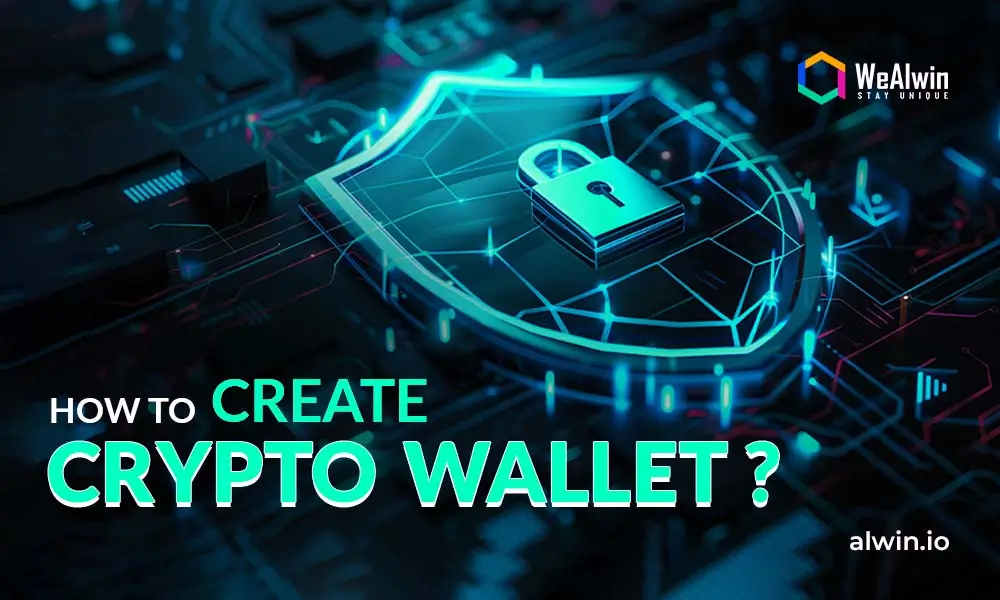Digital currencies are widely used for various transactions, and having a safe and efficient way to store them is crucial. Think of your cryptocurrencies like valuable treasures just as you wouldn’t leave gold coins out in the open, you need a reliable way to protect your digital assets. That’s where a crypto wallet plays an essential role as an effective tool that keeps your investments secure and allows you to explore the exciting world of blockchain technology.
But what exactly is a crypto wallet, and why should you consider creating your own? This blog will guide you to solve the complexities of crypto wallets, explore their various types, and walk you through the essential steps of building one.
In 2022, the number of crypto wallet users worldwide surged to 84 million, reflecting a growing interest in digital assets. With the global crypto wallet market projected to reach USD 48 billion by 2030, understanding how to create and manage a crypto wallet is essential for anyone looking to navigate this dynamic landscape safely and effectively.
What is a Crypto Wallet?
A cryptocurrency wallet is a digital tool that lets you store, manage, and interact with your digital coins. It's completely different from a regular (traditional) wallet, which keeps physical currency; a crypto wallet does not store your cryptocurrencies. Instead, it securely stores the cryptographic keys needed to access digital assets on the blockchain.
Public keys and private keys are the key components of a crypto wallet. The public key is an address, visible to anyone and it’s safe to share with others to receive funds. In contrast, the private key requires your PIN or password to authorize transactions and access your cryptocurrencies. If someone acquires access to your private key, they can take control of your funds.
How Does It Work?
When you transfer or receive cryptocurrencies, you are sending a message via the blockchain, which is a decentralized ledger that records all transactions. Your cryptocurrency wallet facilitates these transactions by using your public and private keys. When you wish to send money, your wallet generates a transaction, signs it with your private key, and sends it to the network for confirmation.
Types of Crypto Wallet
Choosing the correct crypto wallet is crucial for efficient digital asset management. Each wallet type has different features and levels of protection. Here's an overview of the primary types of cryptocurrency wallets:
Hot Wallets
Hot wallets are connected to the internet, making them ideal for frequent transactions and easy access to funds. They enable users to quickly buy, sell, or trade cryptocurrencies with minimal delays. However, their online nature also makes them more vulnerable to hacking and cyber threats. Popular examples include mobile wallets like Trust Wallet and web wallets like MetaMask.
Cold Wallets
Cold wallets offer offline storage for cryptocurrencies, significantly enhancing security for long-term holdings. Since they are not connected to the internet, they are immune to online threats, making them a safe choice for asset management. Users can store their cryptocurrencies on hardware wallets like Trezor or on USB drives that contain wallet files. This method provides peace of mind for those looking to safeguard their investments.
Paper Wallets
Paper wallets consist of physical documents that contain your public and private keys, ensuring complete offline security for your assets. They are resistant to digital hacking, as they are not stored on any electronic device. However, proper care is essential to avoid physical loss or damage, as these documents are vulnerable to wear and tear. Paper wallets are an excellent option for those seeking a secure long-term storage solution.
Why Creating Your Own Crypto Wallet Is Essential?
Creating your crypto wallet is essential for maintaining control, security, and personalization. By managing your wallet, you have full ownership of your private keys and funds, which reduces your reliance on third-party services and lowers the risk of hacks. A custom wallet also lets you implement security features modified to your needs, enhancing protection against unauthorized access. Plus, you can design functionalities that serve specifically to your users for a better experience. For businesses, a unique wallet offers branding opportunities and helps to establish a distinct identity in the crypto world. Ultimately, having your crypto wallet is key to effectively managing your digital assets.
Cryptocurrency Wallet Development
Cryptocurrency wallet development involves several stages aimed at refining the best solutions for users. This process includes secure key management, integration of advanced security features, and the design of user-friendly interfaces. By prioritizing these aspects, developers ensure that wallets facilitate smooth transactions while safeguarding user data and funds. Ultimately, effective wallet development helps businesses advance in the fast-paced cryptocurrency landscape, allowing them to adapt and succeed in a constantly changing market.
How to Create a Crypto Wallet?
Creating a crypto wallet can seem complex, but breaking it down into clear steps makes the process manageable and straightforward. Here’s how to develop a secure and user-friendly crypto wallet customized to your needs:
Determine Your Wallet Type
Wallet creation begins by determining the wallet, whether you want a hot wallet for quick access and frequent transactions or a cold wallet for added protection. Hot wallets, such as mobile or online wallets, are best for active trading, and cold wallets, such as hardware or paper wallets, are better for long-term storage.
Choose the Right Development Platform
Choose a reliable platform or framework for your wallet development. Popular choices include Ethereum, Bitcoin, or cross-platform solutions. Take the time to examine the individual features and requirements of each choice to determine which one is best suited to your project's demands.
Implement Secure Key Management
Build a strong system for generating and managing private and public keys, as this is essential for your wallet’s security. Make sure the keys are generated securely and stored in an encrypted format to protect against unauthorized access.
Integrate Advanced Security Features
Incorporate essential security measures like two-factor authentication (2FA), biometric verification, and encryption protocols. These features help protect users’ funds and data from potential threats and breaches.
Build Core Functionalities
Develop your wallet's essential functionality, such as cryptocurrency sending and receiving, transaction history tracking, and backup and recovery choices. To provide a consistent user experience, make these features clear and simple to utilize.
Design a User-Friendly Interface
Create a user-friendly interface that simplifies navigation for users. Focus on a simple design that allows users to manage their assets effortlessly. It enhances overall usability and satisfaction.
Conduct Thorough Testing
Before launching your wallet, carry out thorough testing to identify and resolve any bugs or vulnerabilities. Assess functionality, security, and user experience across different devices and platforms to ensure the wallet is reliable and user-friendly.
Launch and Monitor
Following the testing phase, launch your crypto wallet and actively monitor its performance. Gather user feedback and be prepared to implement updates and improvements to enhance functionality and security over time.
Essential Features of a Crypto Wallet App
When creating a crypto wallet app, integrating essential features is vital for delivering functionality, security, and an exceptional user experience. Here are the essential features you should consider including:
User Authentication: Execute strong authentication methods, such as two-factor authentication (2FA) or biometric security, to protect user accounts from unauthorized access.
Multi-Currency Support: This allows users to manage multiple cryptocurrencies within the same wallet. This function gives consumers more freedom and ease while dealing with diverse digital materials.
Secure Key Management: Ensure secure generation, storage, and backup of private and public keys. This is critical for protecting users' assets from possible attacks.
Transaction History: Users can access comprehensive data of their transactions, including dates, amounts, and transaction IDs. Tracking expenses and securing transparency are essential in financial activities.
QR Code Scanning: Users can easily share their wallet address and complete transactions with QR code functionality. It optimizes the process of transferring and receiving cryptocurrency.
Real-Time Market Data: Update the app with live updates on cryptocurrency prices, market trends, and charts. Users can access real-time information for decision-making about their investment. This feature is essential in the volatile market.
How WeAlwin Technologies Can Assist in Crypto Wallet Development?
We are experts in wallet development services and know how competitive the market can be. Our pre-built wallet solutions are designed to efficiently meet your needs, helping you save time and reduce costs. With Our White Label Cryptocurrency Wallet Development, you can create a customizable crypto wallet featuring unique functionalities customized just for you. Our developers manage the entire crypto wallet development process from start to finish. We are here to understand your specific requirements and provide outstanding white-label solutions for your business.
Sum Up
Developing a crypto wallet is a detailed process that involves several stages, including design, security integration, and optimizing user experience. As a notable Cryptocurrency Wallet Development Company, WeAlwin Technologies draws on our deep understanding of the crypto landscape to create customized solutions that fit your unique needs. Our team pays close attention to every detail to ensure your wallet is functional but also secure and user-friendly. With our expertise, you can confidently tackle the challenges of crypto wallet development and launch a high-quality product that stands out in the market.



